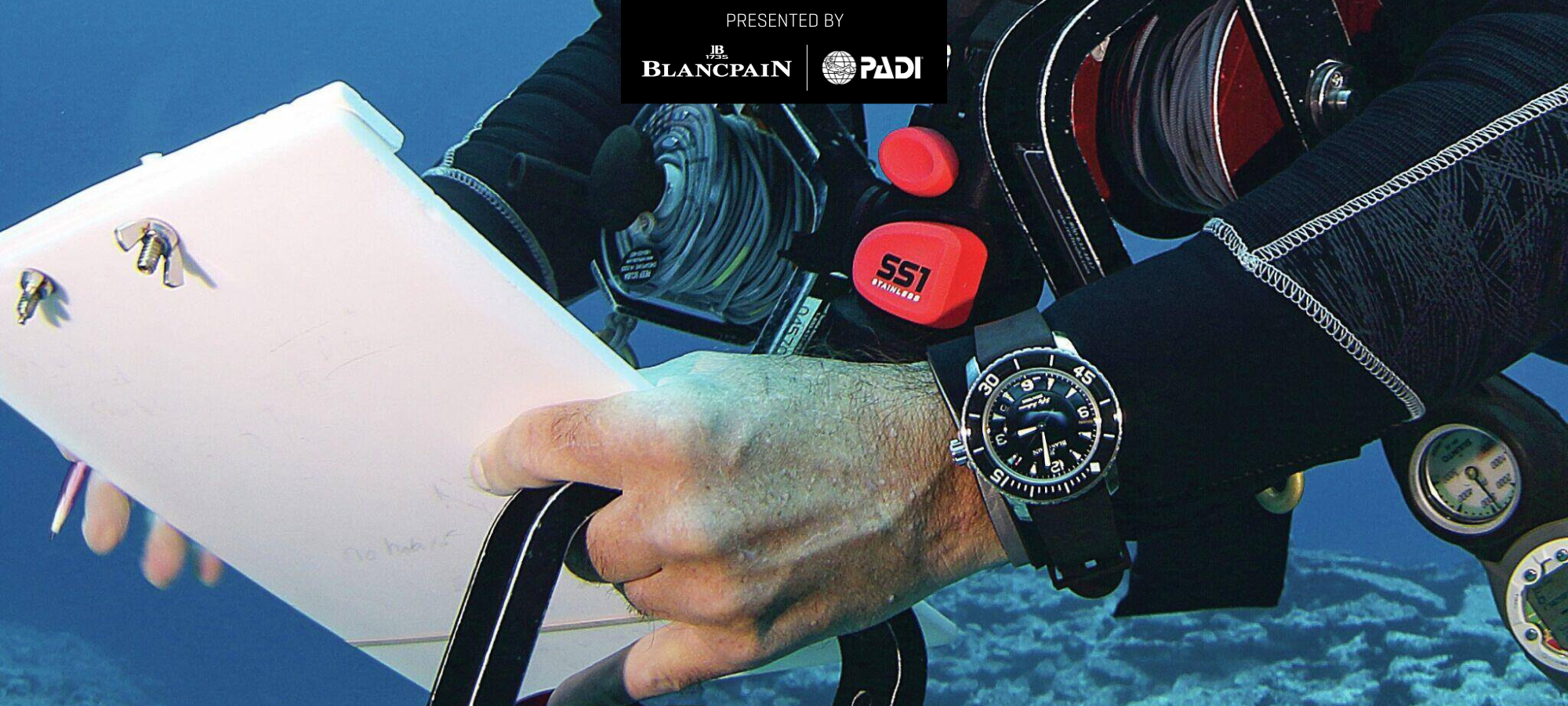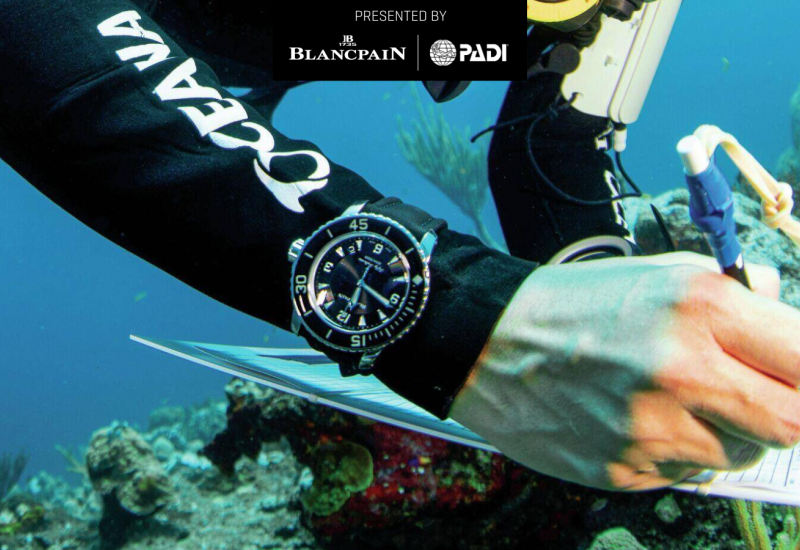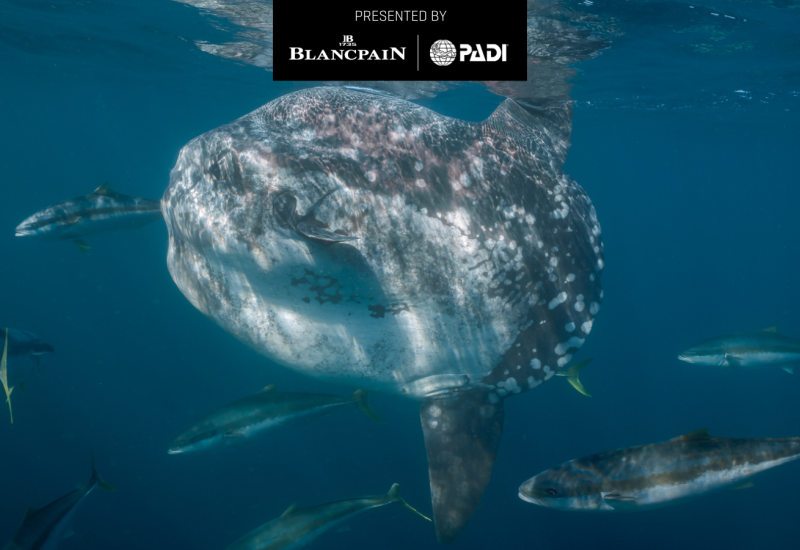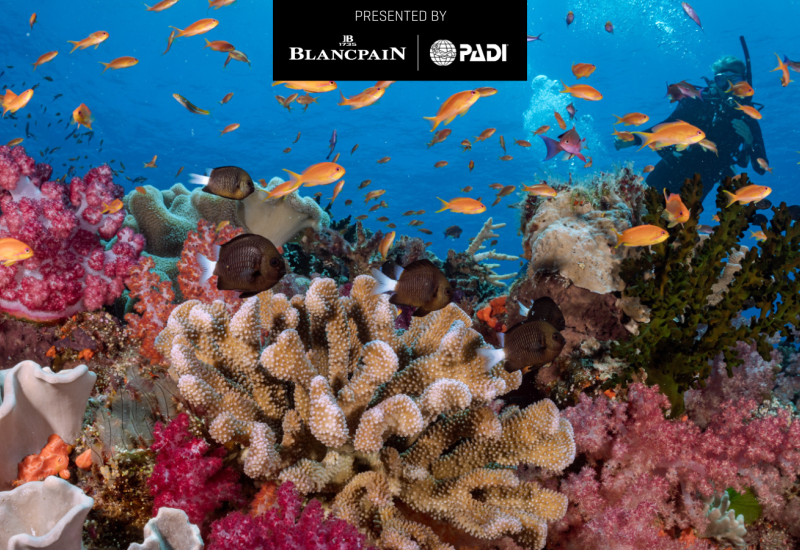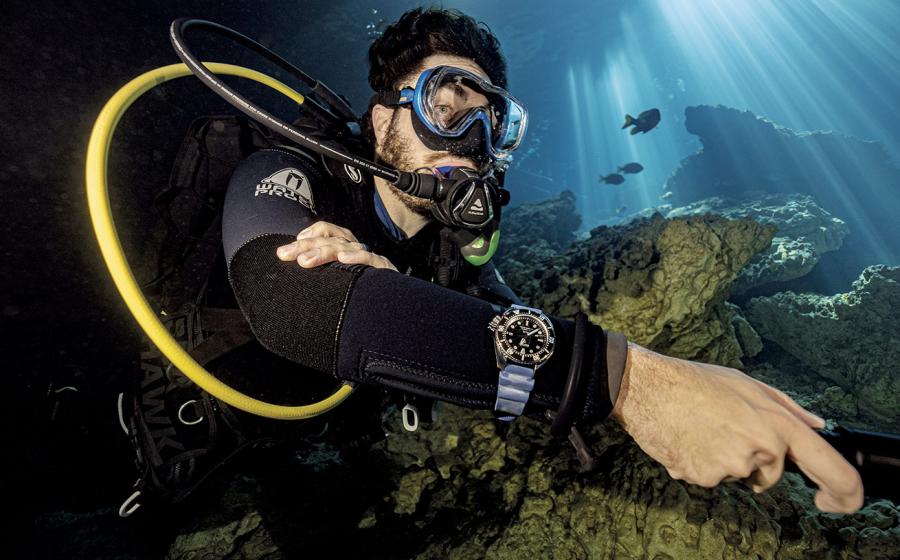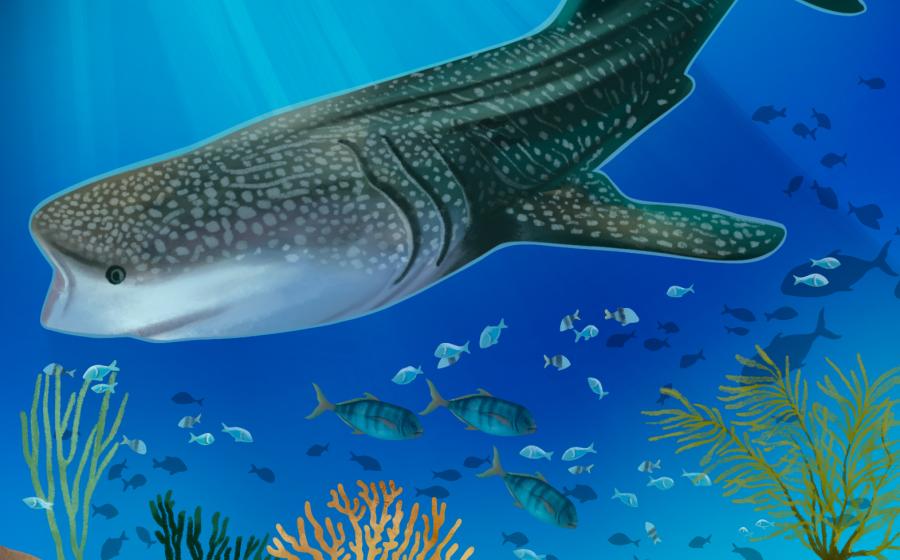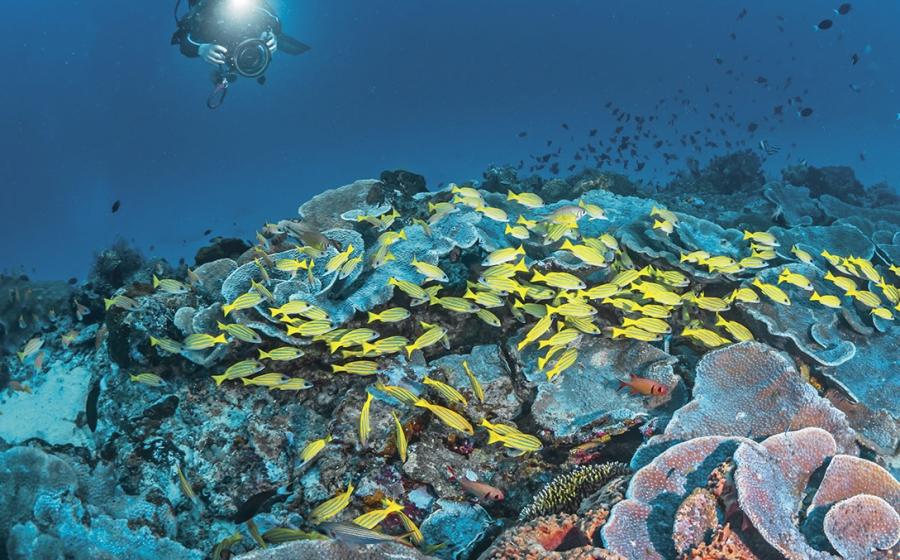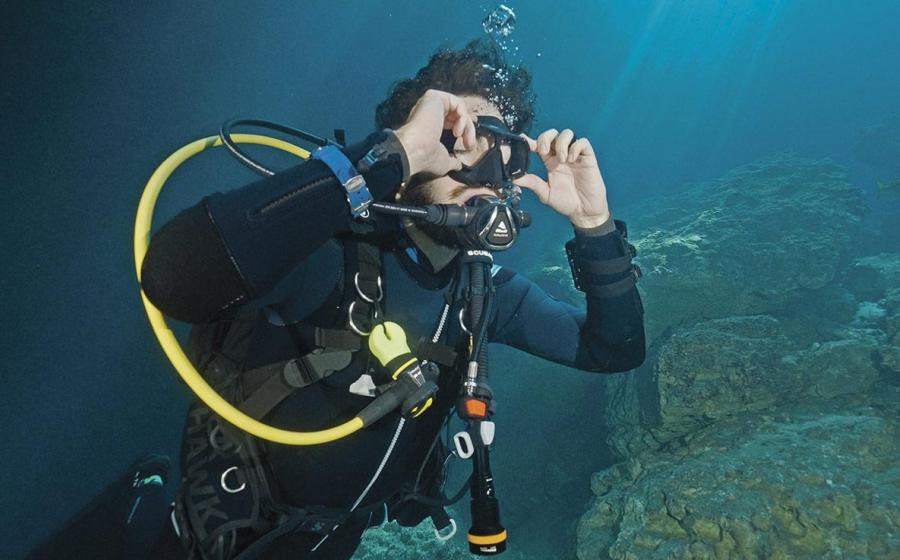Pathways to Protection
When PADI®, PADI AWARE Foundation™ and Blancpain joined forces to significantly increase the number of marine protected areas (MPAs) and to protect 30% of the ocean by 2030, they knew they would need the support of PADI’s global network of 6,600 dive centers and resorts and more than 128,000 professional members.
At the heart of their initiative is the citizen science program Adopt the Blue™ and its goal of establishing thousands of small protected areas around the world. The Blancpain MPA Grant and PADI AWARE Community Grant program supports the critical conservation work being done in Adopt the Blue sites by funding these efforts in local communities.
Blancpain and PADI AWARE have committed to providing over $10 million in funding by 2030 to community projects, including coral reef restoration, marine species protection and climate change mitigation. The program gives direct financial resources to PADI Dive Centers and Resorts as well as community-based nonprofits. Three early grant recipients shared the progress that’s been made.
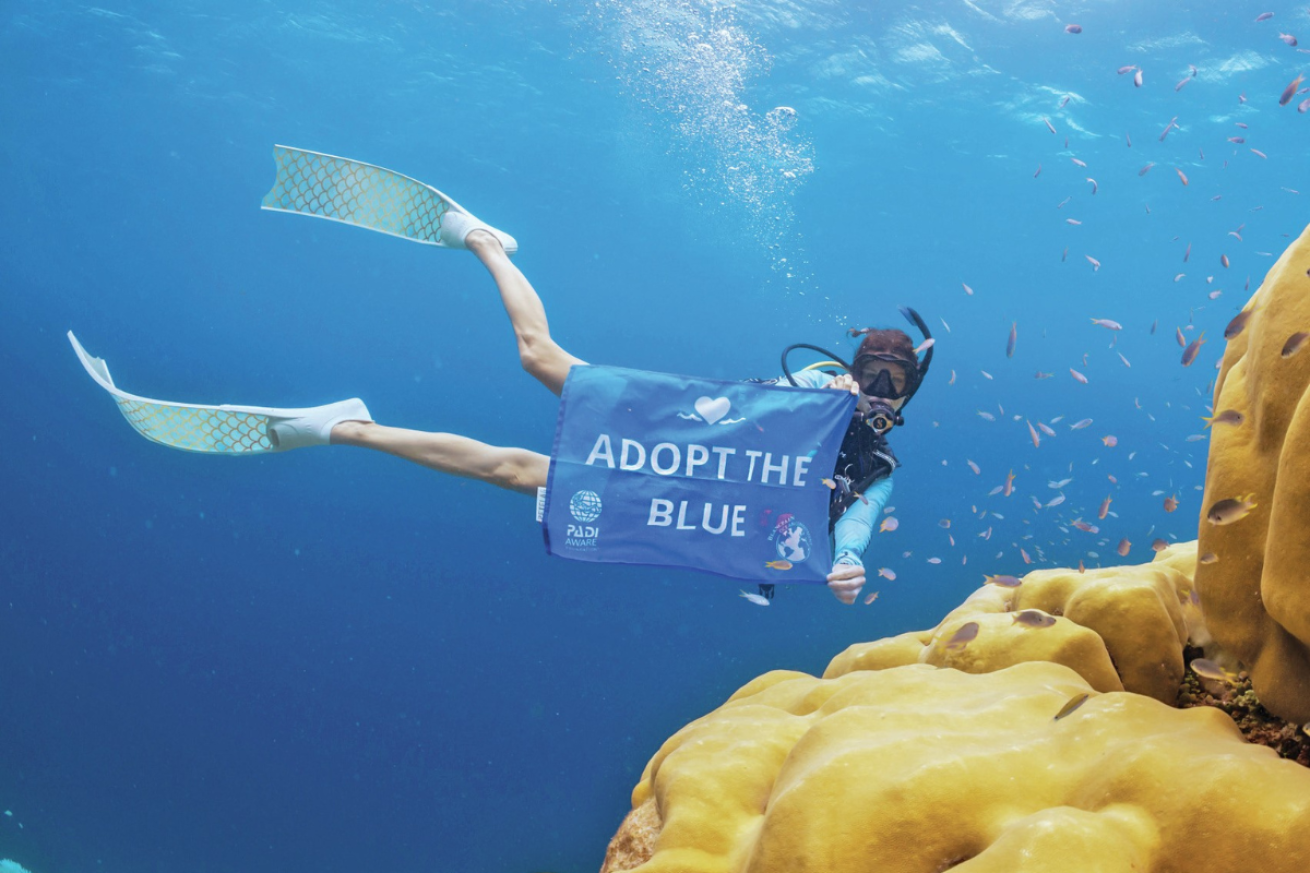
© MANU SAN FELIXA global movement that supports conservation on the local level, Adopt the Blue is a key component of reaching the goal to protect 30% of the world’s oceans by 2030.
MPA and Community Grantee: Acqua Sub
“The grant has been crucial in enabling us to conduct 25 field expeditions to survey reef fish species and assess the seabed in the Setiba Marine Protection Area,” says Ivan Costa Santos, PADI Course Director with Acqua Sub, a PADI Five Star IDC Resort in Guarapari, Brazil. “These efforts have significantly increased our understanding of the local marine ecosystem, helping us identify key species and threats such as habitat degradation and illegal fishing activities.”
The funding helped Acqua Sub survey reef fish species in the Setiba MPA and its surrounding waters to determine whether the MPA is sufficient to conserve the reef fish in Guarapari. The Acqua Sub team is also assessing the seabed to determine the predominant type of coral cover and recording damages and potential threats. Ultimately, Santos hopes he can persuade the local government to step up its environmental enforcement in the Setiba MPA and expand its boundaries.
“I know this goal is very ambitious,” Santos says. “However, I believe the grant provided the beginning—the kickoff.”
Created in 1953, the Fifty Fathoms is the first true diver’s watch. Created by Blancpain CEO Jean-Jacques Fiechter, an avid diver, to meet the needs of underwater exploration, it was chosen by diving pioneers and combat diver corps around the world as a professional timekeeping instrument. With its water resistance, robust doubled-sealed crown, self-winding movement, contrasting dark dial with luminescent indications, lockable rotating bezel and anti-magnetic protection, the Fifty Fathoms became an indispensable instrument for divers on their underwater missions.
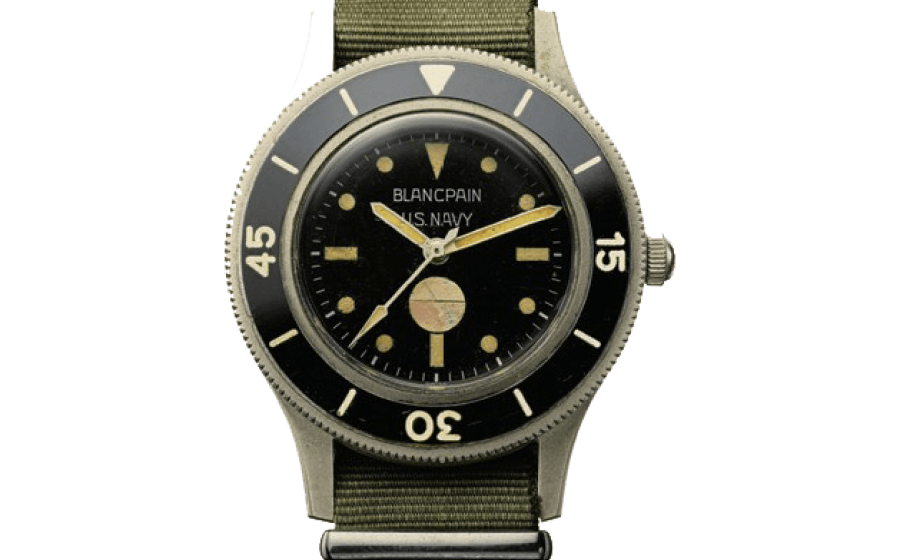
These key signature elements that established the Fifty Fathoms as the archetypal diver’s watch continue to define the identity of such timepieces for the entire watch industry. Bearing witness to the past while simultaneously looking firmly to the future, contemporary Fifty Fathoms models incorporate modern in-house movements renowned for their robustness and reliability. They feature numerous technical innovations derived from Blancpain’s longstanding experience in the field of diving, its risks and its imperious necessities.
The Fifty Fathoms has played an essential role in the development of scuba diving and thus the discovery of the ocean world. It has enabled Blancpain to forge close links with the ocean community that have been consistently strengthened for more than 70 years. The Fifty Fathoms is the catalyst for Blancpain’s commitment to ocean conservation, known as the Blancpain Ocean Commitment.
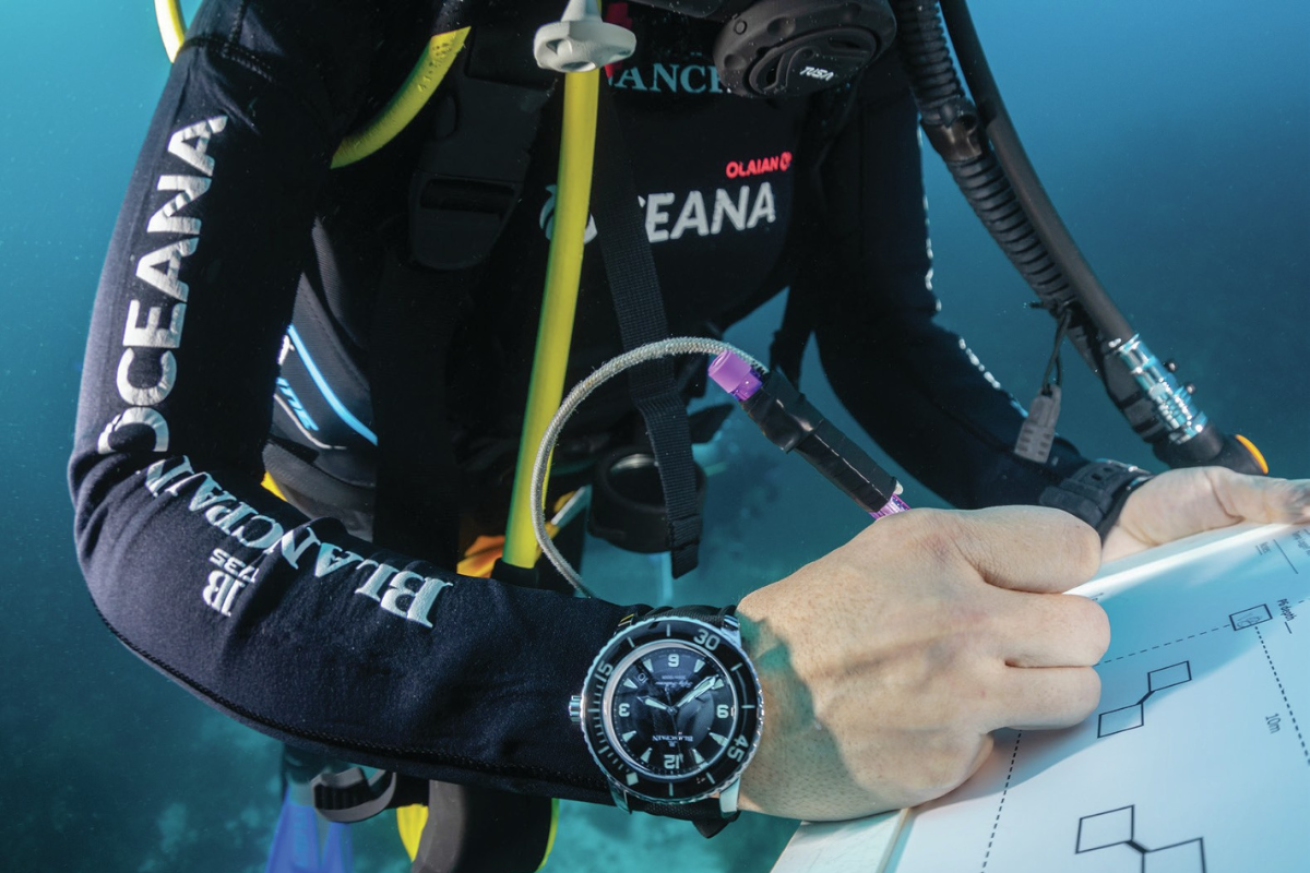
@OCEANAOceana’s 2021 and 2022 expeditions with Blancpain’s support demonstrated the need for an MPA in the Gulf of Mexico, leading to the creation of the 1.3 million-hectare Bajos del Norte National Park in January 2024. Later that year, Oceana worked to expand this protected area with the creation of another MPA.
MPA and Community Grantee: Marine Conservation Philippines
Marine Conservation Philippines used the funds to jump-start efforts to educate its local community on where the MPAs are, how they benefit the local economy, and the diverse wildlife within these protected reserves.
“The grant application process was fast, transparent and allowed us to rapidly get to work,” says Søren Knudsen, director of Marine Conservation Philippines. “It was community feedback and needs that prompted Marine Conservation Philippines to seek the grant, allowing communities to clearly delineate fishing grounds from protected areas by high-viz buoys.”
In addition to demarcation, the organization placed signage at each site to denote the protected areas and the fact that fishing is prohibited within their boundaries. It also created site-specific educational materials to explain the importance of MPAs and the marine species found within their boundaries, as well as the benefits to the local community.
The work undertaken by the Marine Conservation Philippines team, alongside local volunteers, has not always been easy, says Knudsen. “A frustrating challenge we have encountered has been vandalism or sabotage, where some buoys have been removed by outside parties—presumably by outside fishermen who are unhappy their claim of plausible ignorance of sanctuary boundaries is threatened.” But the successes have included the involvement and enthusiasm of local volunteers, who have deployed sinkers and buoys and aided in “the whole logistics apparatus behind the operation,” Knudsen says.
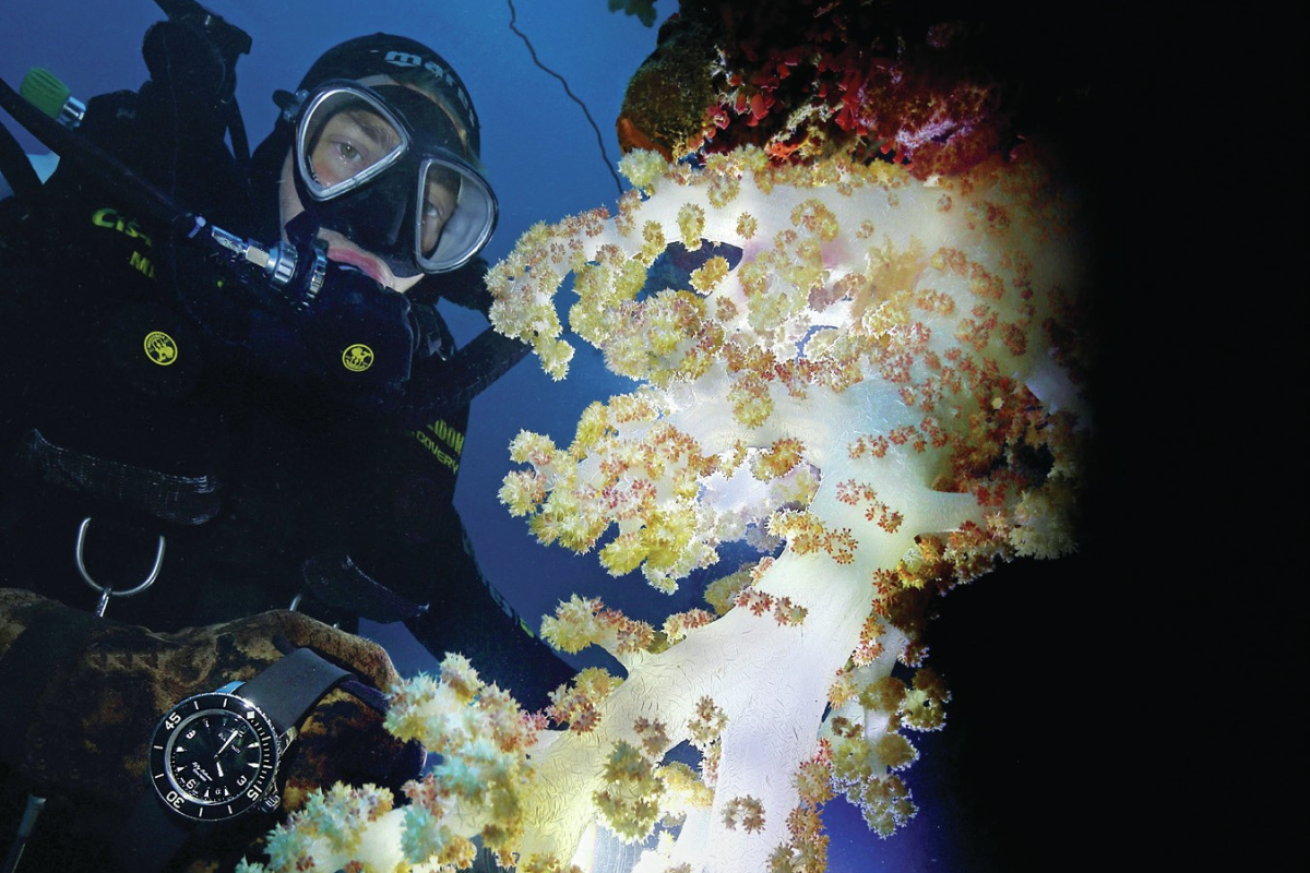
@MANU SAN FÉLIXPristine Seas Expeditions are dedicated to exploring and protecting the few remaining truly unspoiled wild ocean areas on Earth. Of the 14 expeditions supported by Blancpain, 12 resulted in governmental decrees doubling the surface area of protected ocean, with the addition of 4.7 million square kilometers.
MPA and Community Grantee: Beqa Adventure Divers
The grant awarded to Beqa Adventure Divers (BAD), of Pacific Harbour, Fiji, allowed the team to conduct crucial surveys at its Adopt the Blue site—the Shark Reef Marine Reserve (SRMR)—to assess the impact of poaching during the COVID pandemic. By comparing current fish population data with pre-pandemic records, BAD identified shifts in species dynamics, providing essential insights to local authorities for improving MPA protections.
“BAD plays a pivotal role in the protection and management of the SRMR, which they established in 2004 as Fiji’s first shark sanctuary,” says Natasha Marosi, director of conservation at BAD. “The reserve was created in collaboration with the Fiji Ministry of Fisheries and the village of Galoa, which relinquished their traditionally held fishing rights in exchange for a financial levy from divers, which supports their ongoing community projects.”
BAD is responsible for daily management of the reserve and actively conducts patrols to combat poaching, which remains the biggest threat. “We have trained around 100 fish wardens from local communities, empowering them to monitor and protect the marine area effectively,” says Marosi. “With support from the grant, we have been able to successfully conduct our patrols and have caught many poachers, including successive offenders.”
BAD’s conservation approach not only focuses on sharks but also aims to preserve the entire marine ecosystem, enhancing biodiversity and improving fishing yields in adjacent unprotected areas. “This has resulted in a win-win for both biodiversity and the village of Galoa,” Marosi says. “The SRMR went from having 150 species of fish to about 500 and from seeing four to six bull sharks on a single dive to about 100 during the peak season, while the village has seen a bounty in their fish yields in the unprotected areas.”
Small Steps, Giant Achievements
Despite the challenges and myriad logistics involved in their conservation work, all three grant recipients expressed optimism for the future. “The grant gave us hope that biodiversity could be restored, and the Shark Reef Marine Reserve could once again be a sanctuary not only for sharks but for every creature calling the reef ecosystem home,” says Marosi.
“The grant has been a vital resource in helping us take these critical first steps,” Santos says. “It is a legacy for generations to come.”
Leaving a meaningful legacy also underpins the work of Marine Conservation Philippines. “When you stand at the water’s edge and gaze at the sea wondering how you can protect the reefs and the fish populations they harbor, just turn around,” Knudsen says. “Look at the communities and villages behind you, because that is where protection starts.”
Become an MPA and Community Grantee
Funding is limited to nonprofits and PADI Dive Centers. Grants will be awarded to ocean protection initiatives and projects that directly advance the PADI Blueprint for Ocean Action, in direct support of the United Nations Decade of Ocean Science for Sustainable Development. All projects must fall under one of these five program areas: vulnerable species protection, coral reefs, marine debris, marine protected areas and climate change. To access the application, visit padi.com/aware/community-grants.
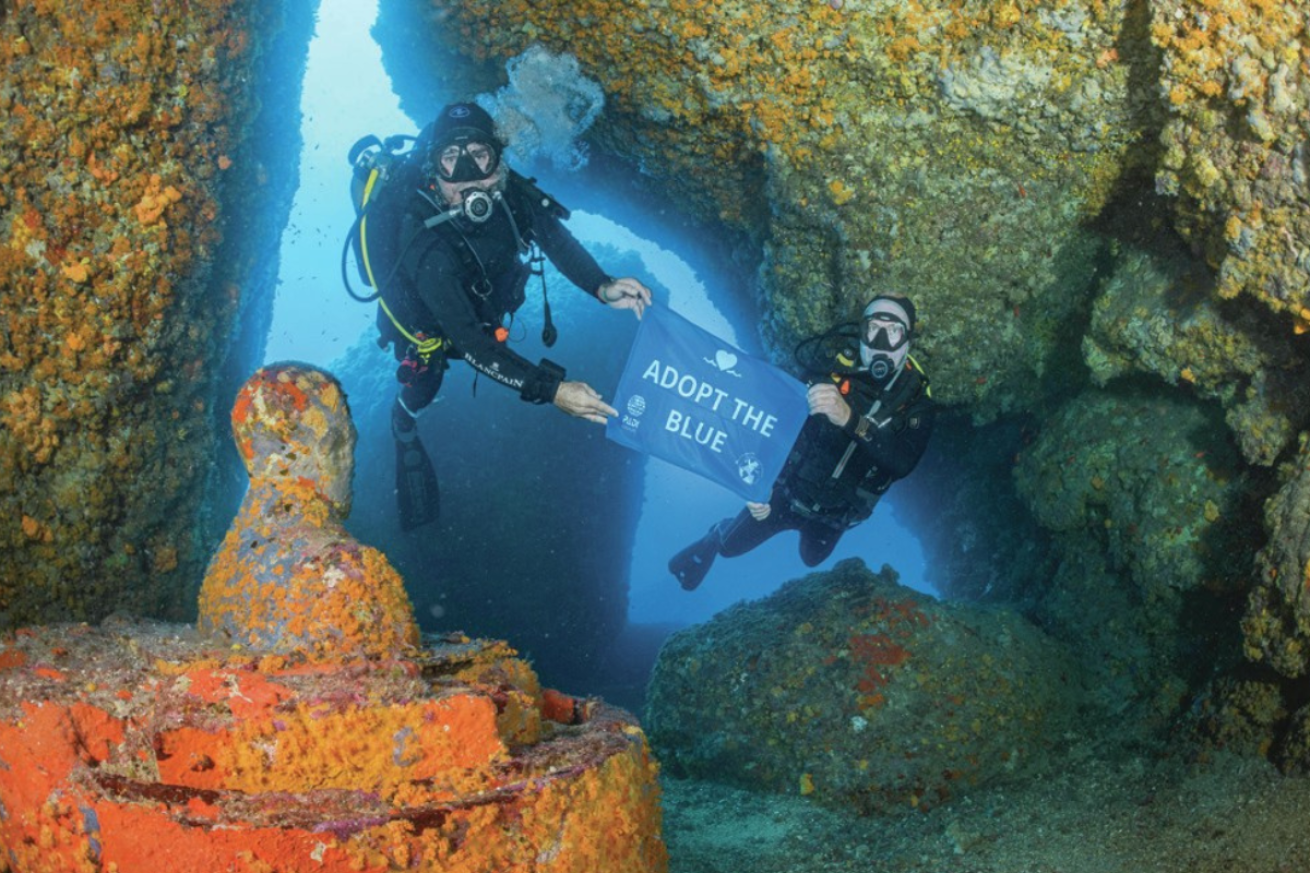
Courtesy of BlancpainBlancpain president and CEO Marc Hayek (left) and PADI president and CEO Drew Richardson.
Blancpain, a Tradition of Innovation Since 1735
Founded in 1735 in the Swiss Jura Mountains, Blancpain is known as the world’s oldest watch brand. Loyal to its tradition of innovation and confirmed by countless horological complications invented over the years, the Manufacture constantly pushes the boundaries of watchmaking to take this art to places it has never been before.
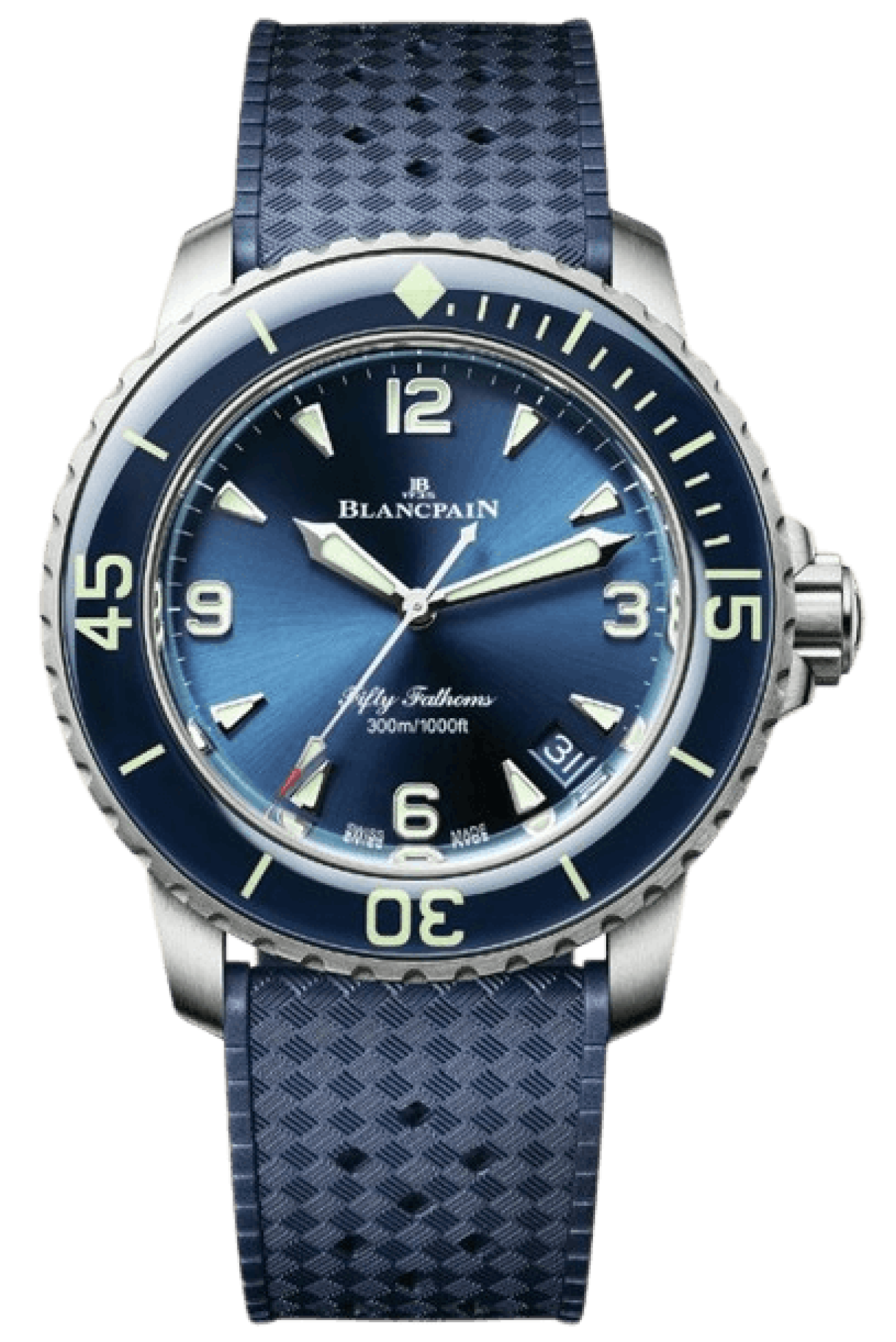
Exploration and preservation of the world’s oceans is at the core of Blancpain. With its legacy of the Fifty Fathoms—the first true diver’s watch—extending over 70 years, Blancpain has been alongside the explorers, photographers, scientists and environmentalists who treasure this precious resource. With that affinity has come a determination to support impactful initiatives dedicated to the oceans.
To date, Blancpain has supported more than 40 major scientific projects and expeditions, celebrated its role in significantly extending the surface area of marine protected areas around the world, and presented several award-winning documentary films, underwater photography exhibitions and publications. This dedication to supporting ocean exploration and preservation is called Blancpain Ocean Commitment.
Click here to learn more about the Blancpain Ocean Commitment.

